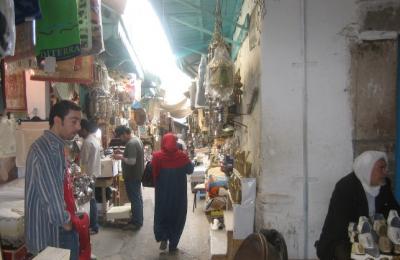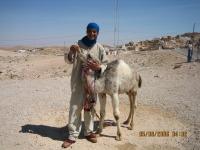The Kirov prison had a farm, the Mukhinsky sovhoos, in Mukhino rajon that needed workers. The number of prisoners working there had decreased - the political prisoners who had survived were transferred, and many of the criminal prisoners had been pardoned.
The shortage of workers was to be filled by people deported to the oblast. We ended up on the farm “Utshastok” no. 2. We lived on the grounds of a former prison camp. The camp gates were kept open and the guards had been removed from the watchtowers. We could move around freely in the surrounding area. There were some one-story barracks with living areas, there was a lounge, a cafeteria, a store , a sauna and a latrine. The living areas differed only with respect to their length and the location of the stove. There were two rows of double bunks that could sleep four, attached to the walls. The bunks were separated by a space less than a metre in width. There was a wider space between the rows of bunks. Still, the space between the bunks had to be wider in front of the windows. Fortunately there were few windows, and they were all in one wall - that made it warmer in the winter. A container with water stood on a bench beside the door. I must not leave out the camp latrine. The structure had walls, a roof and an opening for the door. There were no windows - light came in through the cracks in the wallboards. There was a deep hole under the wooden floor, and a row of holes in the floor above the deep hole. I had never seen anything like that before, and found it truly baffling. In the mornings before going to work, there were always people crouching above the holes, and I felt terribly embarrassed “going” in front of all these people. At that time I didn’t know that similar structures can be found everywhere in Russia, even in resorts on the Black Sea.
We settled into a room at the back of the barracks that did not serve as a passage into other rooms. We had an entire bunk for four for our family of three. Mother and I slept in the lower bunk and Eva on the upper. Our belongings also fit neatly on the top bunk. Aunt Gertrud with Õie also moved into the same room, as did Hilda Otmann with her daughter Vilma, Maie Kolle, Elvine Krevald, Ervin Kikas, Juhan Kuben, Emma Sillam with her daughter Helge, and some other people whose names I can not recall any more. The whole room was teeming with bedbugs. All the cracks in the bunks and in the walls were filled with transparent bedbug skins that came alive when you came near. We arranged a fumigation and slept out of doors at first. I acquired scabies and lice in that camp. The struggle to rid ourselves of the lice was almost hopeless, even though we made use of the “flea-hell” that was attached to the sauna. It was simple. You took off your clothes and put them in a room that had been heated to a high enough temperature to kill off the lice. Sometimes the lice were not scorched, but parts of your clothes were. If it worked, you had a lousefree period.
Advertisement / Reklaam
Advertisement / Reklaam
At Mukhino we were actually paid for our work with money, and you could buy soup and porridge from the camp cafeteria with it. The portions were small, but you were no longer starving, that is, you had something to eat every day. You even had a piece of bread. You bought your daily ration of bread from the camp store. Immediately upon arrival, I thoroughly cased the area for additional sources of nutrients. Our surroundings were totally different. There were no great forests nearby - mostly fields, alternating with forested valleys. A few days later I knew exactly which crops were cultivated where, and relying on my experience from Malyshi, I could easily make forays. No-one was guarding the fields. There could be a problem in bringing the food back into the camp, even though there were no guards, as such, in the camp. The solution was to leave the pilfered food outside the camp grounds. And so I created a little “storage-depot” at the edge of the valley behind the camp, to store these supplements to our rations until late fall. I was the only one who knew about this. Mother did ask once whether I was following the rules in my hoarding. I did not have to lie; I did follow them. The rule was that “private garden plots were sacrosanct”. Fields belonging to the sovhoz surrounded us; the only place where there were individual garden plots was between the camp fence and the stables. I didn’t even know what was grown there. In the summertime we cooked our supplementary food on a campfire behind the camp, and in the winter on the stove in our room. Cooking using the stove was a pain - the stove was small, the logs were damp, and there were many cooks. There were times when the food was half-cooked, and often we could not wait for our turn. But cooking on the camp-fire was a pleasure. The camp-fire was built on the slope leading to the valley behind the camp. We brought water from the stream at the bottom of the valley. We found plenty of wood for our fire around the camp and in the woods on the opposite bank of the stream. At the end of the working day, there were always plenty of cooks. You exchanged “recipes” and the news of the day. I had learned how to cook on the camp-fire. Often I was the one who did the cooking of our evening supplementary ration. The base for all dishes was a gruel made out of flour - a thin one for soup, and a thicker one for porridge. You named your dish after what you added to it: if beet leaves - a beet soup, if sorrel - a sorrel soup, if cabbage leaves - a cabbage soup. In the fall we were able to get potatoes and beets, as well. You had to cut them into cubes and parboil them , and then you added a mix of flour and cold water. Whenever we received a parcel from Estonia, our menu became more complex. I don’t recall that we ever had mushrooms to put into our food in Mukhino. Maybe we didn’t have the strength to go and look for them in the woods at the end of the working-day?Advertisement / Reklaam
Advertisement / Reklaam
But it was strange - no matter how much we ate, or how thick the gruel, we never stopped feeling hungry.(To be continued)




















